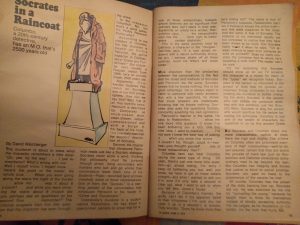May 2, 2020
How WestWorld Season 3 will end: #498 in my Totally Wrong Predictions series
SPOILER ALERT: I obviously don’t know how the season will end, but I am writing this knowing (or, more exactly, “knowing”) what happened in the first seven episodes. So there are spoilers below.
I have never ever even been close to predicting a season finale correctly. But does that stop me? Nah. Someday the script writers will learn to pay attention to how I say show will end the day before it ends and will use that to re-shoot the entire thing because they recognize the superiority of my sense of narrative, theme, and character. For example, did they listen to me when I said the only satisfying way to wrap up Leave it to Beaver would be for June to hire Eddie Haskel to take a hatchet to her husband Ward. Eddie was clearly a sociopath with father issues, and, come on, the family name was “Cleaver.” Talk about your heavy-handed foreshadowing! But would the writers listen? They never do.
Anyway, here’s definitely how Season 3 wraps up tomorrow night. I am certain that I’m getting this one right. 100%. Here goes:
We’ve been watching two simulations, one by Rehoboam the other by Solomon. Rehoboam’s is schizophrenic, because Serac is actually the crazy one, not his brother.
Rehoboam is based around the idea that with enough data, you can predict everything humans will do. Solomon was built on Serac’s brother’s belief that humans ultimately are more unpredictable than that. That’s why you need to gather as many of the “outliers” as you can and use them as a living AI farm. Each of the outliers entombed in the building with Solomon is processing a different world simulation, based not just on the data that Delos has provided from WestWorld but also on the outlier’s own character, personal experience, models, etc. Unless you do this, you end up with a simulation (Rehoboam’s) that is too regular and orderly.
Part of the Big Reveal: Caleb finds his own body in one of the pods in Solomon’s warehouse. His simulation (i.e., the simulation his body is having in conjunction with Solomon) is the most successful one.
Ok, that’s as far as I’ve gotten, except that I find myself hoping that Dolores wins, much as I love Thandie Newton. I’m not at all sure I’m supposed to be that sympathetic to Dolores given that she’s a manipulative, cold-blooded mass murderer. I may be influenced by how fantastically Rachel Evan Wood acts an amazingly complex and difficult role.
The one thing I’m certain of throughout all of this is, that Monday morning I’m going to be reading a bunch of recaps to find out what actually happened.









